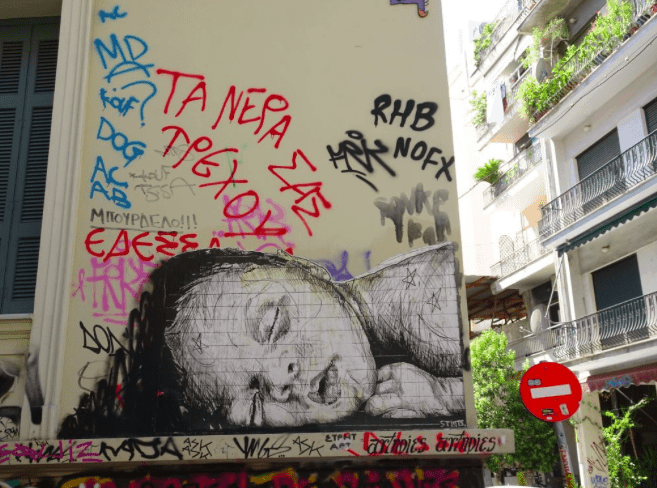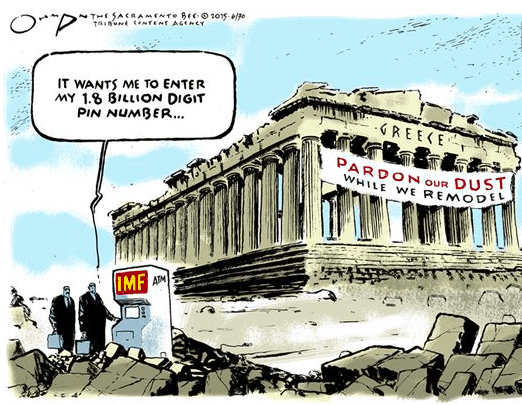
If there is a defining image of Greece in the 20th century it is surely Zorba the Greek, right? That lovable scoundrel-philosopher who was brought alive from the pen of Nikos Kazantzakis summed up what it meant to be Greek: rough, passionate and on occasion as profound as Plato (Kazantzakis’ status remains notoriously in decline in Greece in adverse proportion to foreign appreciation). Had Zorba remained on the page rather than on film though, his representation may not have become as globally renown. Anthony Quinn brought Zorba to life and his lusty performance is so quin-tessentially Greek, few believed the actor was Mexican.
Walter Lassally’s crisp photography captured the contours of Crete’s rugged landscape thus providing the perfect backdrop to Michael Cacoyannis’ cinema masterpiece. Mikis Theodorakis’ pulsating soundtrack sealed its reputation as a classic, climaxing with the sirtaki, whereby Zorba invigorates the buttoned-up Englishman to begin a life incorporating a little madness.
www.youtube.com/watch?v=4UV6HVMRmdk&list=RDfPWU8hy0McY&index=9
Image, sound and movement thus combined to project the essence of Greekness: Mediterranean vitality wins over Anglo frigidity every time. Not a bad philosophy to live by, right? We could well ask in this day and age why Zorba has endured as the pre-eminent representation of all things Greek.
For starters, in 1964 when the film opened Greece was in the ascendance. The ghosts of a war torn country were banished to memory even whilst Crete’s primordial violence was not glossed over. Nevertheless, Zorba was a folkloric tale imbued with great heart and soul. It’s what audiences wanted to see and believe, in an emerging era when Greece got back on its feet economically, produced reliable goods for the consumer market and constructed buildings with whatever concrete it could find. Out with the old shutters and in with the aluminum sliding doors. Boom, shaka, boom!
In crisis-ridden Greece, in its 8th straight year of recession and after 6 years of austerity on steroids, one should ask if Zorba remains a misrepresentation that deserves to be killed off. Zorba has become eclipsed by the zeitgeist because it seems perverse to drink, dance, think and laugh when basic survival is at stake. “Teach me to dance” has transformed into “pay off your debts”. In this regard Zorba should be pensioned off, yet he’s still loitering on the cultural premises. After all your average European conjures ‘Zorba’ to confirm blatant stereotypes. Greeks in entirety are perceived as dishonest and wasting valuable time basking in the sun (whilst hard-working volk are battling grey weather and swindled in return by contributing to EU bailouts). In short Greeks are entirely to blame for their broken economy, corrupt institutions and living off EU handouts. Zorba and the 21st century do not make a good mix do they?
Domestically, Zorba’s kefi has been replaced with rage and despair. When masked protestors, the koukolofori, pitch street battles in Syntagma against the helmeted MAT, these images become new icons and internet memes. Ask any youth in the rioting street and I’ll bet they’ll regard Zorba as an embarrassing cliché best left alone in a retirement home, irrelevant to the anarchy around them. Consider the context. Unemployment stands at almost 60% for young people under 30, with diminished hopes and pinched horizons making for bleak prospects. Torpor, alienation, and ennui are the outcomes, which has severe health and psychological impacts. What value is Zorba to them?
And yet, paradoxically, the arts are thriving in spite of the Greek crisis. Existential struggle, social breakdown, and resistance to the prevailing status quo have created an explosion of dissent, in contrast to Zorba’s merry-making. I’ve mentioned the graffiti artists like INO before, who has tapped into the desolate mood of the times:

Likewise cartoonists are in full flow, not short of subjects to lampoon:

The comedy scene is also flourishing with standup comics relishing the absurdities of coping when society disintegrates, of the farce that goes for politics, and ruefully accepting the diminished dreams of a generation living at their parent’s home well into their 30s.
Films from the “Weird Wave” have become internationally recognized of course with Dogtooth, Alps, The Lobster award-winners as well as Rachel Tsangari’s Chevalier www.youtube.com/watch?v=IUl72aOdKP8
Finally, Christos Ikonomou’s short story collection Something Will Happen, You’ll See (Archipelago Books, 2010) therumpus.net/2016/03/something-will-happen-youll-see-by-christos-ikonomou/
is a tour-de-force that has little of Kazantzakis’ purple prose (although Ikonomou is that rare breed who acknowledged Kazantzakis as a writer of genius). Focusing on the lives of quiet desperation in western Attica where the shipping industry has collapsed and lay-offs have discarded men of Zorba’s vintage to the scrap heap, you get the feeling that representing Greeks today it’s imperative not to get caught up with theatrical gestures or loud voices or bombastic philosophy of the Zorba variety. Better to display modesty and self-criticism for catharsis to occur in these hardened times. You can almost hear the plea from Greek artists today: Zorba, dance all you like, but please don’t break the plates. You’re only drawing attention to yourself.
*Graffiti over Marble, A Portrait of Greece in Crisis is slated for publication in 2017. Sotirios is the author of Lonesome George, C’est Moi! A South American Odyssey (Big Sky Publishing).
You can reach him at [email protected]

